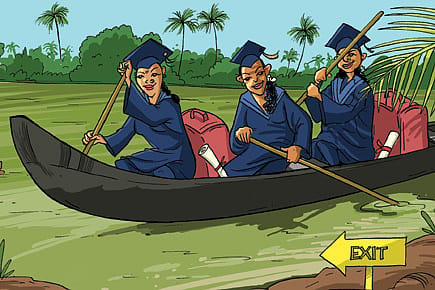Getting the Hell out of God’s Own Country

A survey shows how women are migrating in large numbers out of Kerala
KOCHI ~ It is no secret that for women, Kerala is nowhere near being God’s Own Country, but there is also empirical evidence for it. A survey on migration by the Centre for Development Studies (CDS) has revealed that 33 out of 100 women from Kerala relocate to other states. Interestingly, this has little to do with their spouses or parents migrating. The women are getting out on their own. As much as 69 per cent of women migrants were unmarried.
A little more than half the women migrants, 51 per cent, got out at age 20–24. Educated women also migrated at the first opportunity. Fifty-eight per cent held a professional degree and 34.6 per cent a post-
graduate degree. Among PhD and MPhil holders, migration was significantly higher among women (13 per cent) than men (5 per cent). Women with professional degrees also migrated more than men. While nursing remains the most lucrative career for women migrants, Kerala also loses a fair number of women doctors, engineers, teachers, lawyers and entrepreneurs.
“The rate of unemployment and its unequal proportion between men and women are the primary reasons for this phenomenon,” says Dr Irudaya Rajan, faculty member of CDS, who headed the study along with Dr KC Zachariah, demographer and former fellow of CDS. Dr AK Jayasree, a feminist activist in Kerala, says the reasons are more social and political than economical. “Kerala is becoming more intolerant of women and their rights. It is difficult for women, especially those who have higher education, to live in Kerala,” she says.
2026 Forecast
09 Jan 2026 - Vol 04 | Issue 53
What to read and watch this year
The preference for men is high in Kerala’s labour market. Of the total 8.9 million employed persons in Kerala, 2 million are women and 6.8 million are men, according to the survey. The exodus of women is, however, confined within India. Women migrants outside the country are only 15 per cent of the total 22.8 lakh migrants. “It is an indication of the unequal status and the constraints of mobility among women,” says Dr Rajan.
The study was based on primary data collected from 15,000 households selected at random by a stratified sampling technique covering all the 63 talukas.
